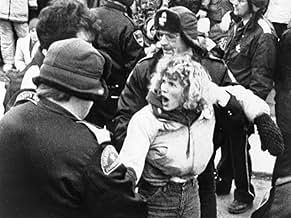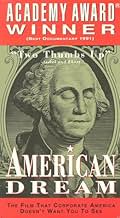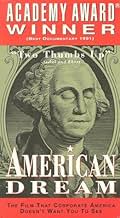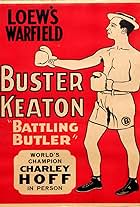IMDb RATING
7.8/10
1.1K
YOUR RATING
Recounts the 1985-86 strike against the Hormel Foods Corporation in Minnesota after its employees' wages and benefits were cut.Recounts the 1985-86 strike against the Hormel Foods Corporation in Minnesota after its employees' wages and benefits were cut.Recounts the 1985-86 strike against the Hormel Foods Corporation in Minnesota after its employees' wages and benefits were cut.
- Won 1 Oscar
- 12 wins & 3 nominations total
Dan Rather
- Self
- (archive footage)
Ronald Reagan
- Self
- (archive footage)
Featured reviews
American Dream (1990)
**** (out of 4)
Barbara Kopple's Oscar-winning documentary follows a meat packing strike in Austin, MN and those familiar with the director's HARLAN COUNTY, USA will certainly have a lot to compare. This film follows the unions decision to pull their workers after Hormel reported a $29 million dollar profit and then asked their workers to take a pay cut and have their benefits reduced. While this film doesn't reach the same heights as HARLAN COUNTY, there's no question that this here is still a pretty remarkable documentary in its own right. There's no question that Kopple knows how to tell a story and more importantly find the passion, fire and energy of a story and exploit it to make sure the message of those individuals get across for the viewers. The documentary was clearly on the side of the workers as this is where we spend the majority of the running time. The first forty-minutes of the film focuses on the pre-strike as we get to know the main people involved and we get a very good idea of the working conditions in America at the time and it's clear that going on strike is very dangerous for a number of reasons. The final hour of the picture deals with the strike as the workers get dragged along for months and the end results aren't anywhere close to a happy ending. As someone who has worked for a union I can see both sides of the coin but it really does seem that the majority of the people lost here and that's a real shame. Kopple does a remarkable job at telling this story and there's no question that your attention will be glued to the film from start to finish.
**** (out of 4)
Barbara Kopple's Oscar-winning documentary follows a meat packing strike in Austin, MN and those familiar with the director's HARLAN COUNTY, USA will certainly have a lot to compare. This film follows the unions decision to pull their workers after Hormel reported a $29 million dollar profit and then asked their workers to take a pay cut and have their benefits reduced. While this film doesn't reach the same heights as HARLAN COUNTY, there's no question that this here is still a pretty remarkable documentary in its own right. There's no question that Kopple knows how to tell a story and more importantly find the passion, fire and energy of a story and exploit it to make sure the message of those individuals get across for the viewers. The documentary was clearly on the side of the workers as this is where we spend the majority of the running time. The first forty-minutes of the film focuses on the pre-strike as we get to know the main people involved and we get a very good idea of the working conditions in America at the time and it's clear that going on strike is very dangerous for a number of reasons. The final hour of the picture deals with the strike as the workers get dragged along for months and the end results aren't anywhere close to a happy ending. As someone who has worked for a union I can see both sides of the coin but it really does seem that the majority of the people lost here and that's a real shame. Kopple does a remarkable job at telling this story and there's no question that your attention will be glued to the film from start to finish.
10jgtoms
This film is absolutely stunning. It centers around union meatpacking workers at a Hormel plant in Austin, Minnesota in the mid-80's. The trouble started when Hormel cut worker pay from $10.69 an hour to $8.25 an hour. The problem? Hormel had just posted a net profit of $30 million. As one worker at a union meeting put it, "If we have to take a cut of $2.45 an hour when the company just made $30 million, I hate to think of what's gonna happen when they actually post a loss." With no help from their parent union, International Food and Commercial Workers Union, the local union (P-9) goes on strike alone trying to bring Hormel to its knees. Director Barbara Kopple, who also made the great "Harlan County, USA", does an outstanding job of capturing every important moment. She has the camera there at every union meeting, press release, Hormel press release, etc. She also shows the very personal aspects of a strike going into people's homes and showing their innermost feelings about what's going on. In the end, the strike is long, drawn out, and things appear bleak. The constant Minnesota cold, snow and ice are always in the background as well. If one doesn't have a greater appreciation for unions and what they have to sometimes endure after watching this film, he/she probably didn't pay very good attention.
I definitely liked this documentary. I usually think of it a little when I see a Hormel product at the grocery store. It was impressively done and it really has an authentic feel to it. For some reason I have not yet seen Harlan County USA, but will certainly do so sometime this year.
I have seen this twice and it is definitely worth more than one viewing. While the tone starts as pro-union, there seems to be at least some hints about their limitations as well later in the film. I spent my childhood in a town nearly 100 miles north of Austin and the film made me appreciative that my father had access to more opportunities when he got laid off (we were much closer to the Minneapolis region than Austin). I could feel for the families of those in Austin during this film as it was primarily a one company town at that time and for all I know it may still be the case.
Documentaries work best when there is a focus on "real" people rather than well known celebrities IMO. This is evidence of that and I recommend this film.
I have seen this twice and it is definitely worth more than one viewing. While the tone starts as pro-union, there seems to be at least some hints about their limitations as well later in the film. I spent my childhood in a town nearly 100 miles north of Austin and the film made me appreciative that my father had access to more opportunities when he got laid off (we were much closer to the Minneapolis region than Austin). I could feel for the families of those in Austin during this film as it was primarily a one company town at that time and for all I know it may still be the case.
Documentaries work best when there is a focus on "real" people rather than well known celebrities IMO. This is evidence of that and I recommend this film.
"American Dream" is a sobering and fascinating documentary depicting the social, economic and emotional ramifications of a labor strike initiated by employees at a Hormel meatpacking plant in Austin, Minnesota. Although the film depicts events that take place in 1986, the content is every bit as relevant today on the subject of the perennial gap that exists between rank-and-file workers and top executives at major U.S. corporations, and the general greed and mercenary attitude that drives said corporations at the expense of hard-working employees. Like "Roger & Me," the acclaimed documentary by Michael Moore that savaged General Motors and the 80's corporate ethos of "profits above everything else," "American Dream" is a priceless portrait of blue-collar work and life in small-town America, the kind of place that people who live in New York, Washington D.C., Los Angeles or any other major metro area will probably never see.
Austin is a town where one company is the largest employer (in this case, the Hormel meat company), on whom generations of workers depend for their livelihood. The film puts a human face on the repercussions that result when Hormel, despite record profits, cuts the salaries of its workers. If the balding, grey-suited, humorless Hormel executives depicted here (wearing huge eyeglasses in the style of Lee Iaccoca) are not the epitome of 80's greed, I don't know what is. They are Gordon Gekko come to life, caring only about their bottom line and how to maximize profit, completely indifferent to the plight of their workers. The Enron debacle shows that, for all their economic might and wealth creation, there is a dark side to corporate America. "American Dream," its ironic title aside, is a journey to that dark side that should be seen by every worker, blue-collar or white-collar. Try to catch it on the Sundance or Independent Film Channel.
Austin is a town where one company is the largest employer (in this case, the Hormel meat company), on whom generations of workers depend for their livelihood. The film puts a human face on the repercussions that result when Hormel, despite record profits, cuts the salaries of its workers. If the balding, grey-suited, humorless Hormel executives depicted here (wearing huge eyeglasses in the style of Lee Iaccoca) are not the epitome of 80's greed, I don't know what is. They are Gordon Gekko come to life, caring only about their bottom line and how to maximize profit, completely indifferent to the plight of their workers. The Enron debacle shows that, for all their economic might and wealth creation, there is a dark side to corporate America. "American Dream," its ironic title aside, is a journey to that dark side that should be seen by every worker, blue-collar or white-collar. Try to catch it on the Sundance or Independent Film Channel.
Barbara Kopple's American Dream is a painful but honest on all sides look at what labor unions have to go through when they go into strike- mode, and how corporations, starting in the 80's, say the unions flaws in negotiating as a means to get in to change things for their benefit. It's that kind of movie though that doesn't discriminate in a key way - I think if you're pro-union or anti-union even, you can get something out of this take by how Kopple presents everything. The characters here all want what's best, but it's not so simple as'let's negotiate a contract'. Sides become fractured, tempers get flared, and a 'labor consultant' arguably muddies the waters early on in the negotiating. By the time it gets to be many weeks into the strike, some of the folks on the picket lines get desperate, cross and go back to work, and the sides become even more fractured.
It's about the Hormel meat-packing district, but the staying power of the film is this: it could be anywhere. Is it just about if wages decrease by two dollars, or four dollars, or about something more when it comes to bargaining, the rights of workers, and who is really in control? The interviews and perspective are in large part on Lewie Anderson, who probably has the most common sense as we can see it (or rather in comparison with the Consultant Ray Rogers, who is technically a corporate guy as well), and how he has to approach the union and the chief committee about where to go with Hormel - and of course the flaws are there, like rewriting the contract that has forty years of bargaining in it for the rights of the workers.
This is not to say that, for the warts-and-all approach Kopple takes, that she is on the side of the corporate masters at Hormel. We see one of their spokesman, who is a down-the-line party guy, talk to the camera(s) with the candor that one expects from such a corporate man about dealing with the union leaders (maybe not as villainous as, say, a Roger Smith from Roger & Me, but what is). But it's mostly there, in those halls and on the picket lines and in those smokey, emotional offices that Kopple takes her sights and tells this story. How it becomes a tale for almost everyone (not to say that, probably, those who have worked in unions or know people who have, that makes up a good lot of Americans, will connect deeper with it) is that it's not about complex legal wrangling. It's about what people do when pushed up against a wall, and put themselves into a war.
It is a complicated tale to tell, that is without easy answers, but by the end you can't say you don't see how things did not turn out well, especially with the greater picture (albeit not shown really or at least on the level of the 'smaller-but-bigger' picture the director paints) that the country was in at the time, and still are. What happens to these Americans, all hard workers, when faced against corporate pressures, and then other workers are brought in across the picket lines. What happens to society?
It's about the Hormel meat-packing district, but the staying power of the film is this: it could be anywhere. Is it just about if wages decrease by two dollars, or four dollars, or about something more when it comes to bargaining, the rights of workers, and who is really in control? The interviews and perspective are in large part on Lewie Anderson, who probably has the most common sense as we can see it (or rather in comparison with the Consultant Ray Rogers, who is technically a corporate guy as well), and how he has to approach the union and the chief committee about where to go with Hormel - and of course the flaws are there, like rewriting the contract that has forty years of bargaining in it for the rights of the workers.
This is not to say that, for the warts-and-all approach Kopple takes, that she is on the side of the corporate masters at Hormel. We see one of their spokesman, who is a down-the-line party guy, talk to the camera(s) with the candor that one expects from such a corporate man about dealing with the union leaders (maybe not as villainous as, say, a Roger Smith from Roger & Me, but what is). But it's mostly there, in those halls and on the picket lines and in those smokey, emotional offices that Kopple takes her sights and tells this story. How it becomes a tale for almost everyone (not to say that, probably, those who have worked in unions or know people who have, that makes up a good lot of Americans, will connect deeper with it) is that it's not about complex legal wrangling. It's about what people do when pushed up against a wall, and put themselves into a war.
It is a complicated tale to tell, that is without easy answers, but by the end you can't say you don't see how things did not turn out well, especially with the greater picture (albeit not shown really or at least on the level of the 'smaller-but-bigger' picture the director paints) that the country was in at the time, and still are. What happens to these Americans, all hard workers, when faced against corporate pressures, and then other workers are brought in across the picket lines. What happens to society?
Did you know
- How long is American Dream?Powered by Alexa
Details
- Release date
- Countries of origin
- Official site
- Language
- Also known as
- Американская мечта
- Filming locations
- Production companies
- See more company credits at IMDbPro
Box office
- Gross US & Canada
- $269,823
- Opening weekend US & Canada
- $9,291
- Mar 22, 1992
- Gross worldwide
- $269,823
Contribute to this page
Suggest an edit or add missing content






















